- Home
- Seanan McGuire
The First Fall
The First Fall Read online
The First Fall
by
Seanan McGuire
Buckley Township, Michigan, 1935
The sky outside was full dark and spattered with stars when Enid Healy decided that sleep was over for the night; it had gone, leaving her wide-awake and aching in her bed, and the best thing she could do was get up before she woke her husband. Alexander was going to have a hard enough day ahead of him—they all of them were—without starting the morning worn out by her restlessness. Moving as quietly as she could, she slipped out of the warm bedclothes, shrugged on her robe, and made her way out of the room to the stairs.
She paused there with her hand on the bannister, looking over her shoulder at the closed door of the bedroom shared by her son and daughter-in-law. Jonathan probably wasn’t sleeping much either, given the circumstances. Fran would be, but only because her tea had been dosed with a little something to ease her way into a deep and dreamless slumber. Out of all of them, Fran needed the rest most of all.
Enid sighed. In any kind world, they wouldn’t be going through this. In any kind world, their sleepless nights would have an altogether different cause—a much happier one. She had long since given up hoping that she would ever live in any sort of kind world.
Still moving as quietly as she could, Enid descended the stairs.
There was something to be said for spending decades in the same house. She didn’t need a light as she navigated the hallway to the kitchen—every piece of furniture and knick-knack was so familiar as to be almost an extension of her own arm. When she reached the kitchen doorway she flicked on the light, filling the room with a soft yellow glow. The mouse that had been sitting patiently on the counter straightened, resting its weight on its haunches as it nervously adjusted its tiny denim cape. Fran’s work, no doubt; the stitches were too fine and regular to be Enid’s. She had never much cared for sewing.
“Good morning to you,” she said politely, as she started toward the sink. She paused only long enough to retrieve the big black kettle from the stove. They were going to need a lot of coffee, strong and hot, before they left for the churchyard. “Have you been waiting long?”
“No, Priestess,” replied the mouse, in a subdued squeak. “We have been Taking Turns since the God of Unexpected Situations carried the Violent Priestess away to the bedchamber, where we have been bid not to go, lest we trouble her further. Is she…is she well, Priestess? She does not speak to us. She does not come to evening services, or mend that which has been worn and broken.”
“Frannie’s having a hard time of it right now, just like all the rest of us, but more so,” said Enid. She placed the kettle under the tap and turned the water on. “You mind Johnny where she’s concerned, you hear me? He knows what’s best for his own wife.” And maybe if she said those words often enough, she’d start to actually believe them. Johnny was as lost as Fran. They were two stranded souls in the same desert, and until they started pulling each other across the wasteland, they were never going to make it safely home.
“She mourns the God of Early Arrivals and Earlier Departures,” said the mouse. There was a quiet heartbreak in its words, especially as it spoke the second half of the title, which was so horribly, achingly new. It hadn’t been needed three days before, and now it was going to be remembered by the mice for as long as the colony endured.
Tears sprang to Enid’s eyes, hot and bitter as seawater. We’re all just one heartbeat from the ocean anyway, she thought, as she blinked them away. Of course the mouse was upset; the whole colony would be in mourning. They always were when a member of the family…
Enid took a shaky breath, and said, “Yes, she does. We all do, but Frannie mourns him most of all, because she was his mother, and mothers mourn for their sons. You understand that, don’t you?”
The mouse nodded. “I do, Priestess. That is why we have been waiting here for you throughout the night, rather than troubling the Violent Priestess with our request.”
“And what request would that be?” Enid asked, fighting to keep her tone level.
“The God of Early Arrivals and Earlier Departures was beloved to us. He will be forever part of the pantheon that watches over the colony from the place beyond the attic, where the cheese and cake are bountiful, and where we will all one day go.” The mouse spoke with absolute and utter conviction. There was a Heaven; Daniel was there; one day all the mice would go to join him.
“I know,” said Enid.
“We wish to send a member of the colony with you today, to bear witness to the burial. It…” Here the mouse faltered, seeming to search for the appropriate words. It looked almost lost, sitting alone on the counter, dwarfed by everything around it. Finally, it said, “It would break our hearts to know that in the end, a part of who he was in this world was left outside the scripture. It is our duty to remember those who go. We cannot do that if we do not bear witness.”
Enid hesitated. “You want to send an envoy to the funeral, is that it?”
“Yes, Priestess.”
“And you didn’t want to ask Fran, because you knew that she’d be upset.”
“We were afraid she would refuse us,” admitted the mouse. “We would not come if she told us no, but we are so afraid of leaving the God of Early Arrivals And Earlier Departures alone in the dark, with no ending to his story and no one to ever tell your children how he was safely laid to rest.”
“You can come.” Jonathan’s voice was still thick with sleep, as unexpected in the quiet kitchen as the sound of gunfire. Less expected, maybe—this was the Healy household, after all.
Enid turned, feeling obscurely guilty, even though all she had done was get out of bed and have a conversation with a mouse. Both were perfectly normal things to do, even under unusual circumstances like these. “Johnny. I didn’t hear you get up.”
“You didn’t think I’d be up for hours, you mean, with the sedatives that you slipped into my evening tea. Don’t bother trying to lie to me about it, Mother—your guilt is written plain as day across your face. How much did you put into Fran’s coffee?”
“Enough,” Enid admitted. “She needed to get some sleep before…” She faltered. Saying “funeral” seemed so damn final, and not saying it felt like a lie. “Well, before.”
“We all did,” said Jonathan. He focused his attention back on the mouse. “You are welcome at the funeral of my son. I am sure his mother would say the same, if she were in any condition to speak with you.”
“Thank you,” said the mouse.
“But you must follow all the rules, and one new rule. If you don’t feel you can do that, you can’t come.”
“Anything,” said the mouse.
Jonathan took a deep breath, momentarily closing his eyes before opening them and saying, “Leave Fran alone. She’ll talk to you when she’s ready to talk, but for now, treat her like you would a stranger, and stay out of her sight.”
“It Shall Be So,” said the mouse.
Enid, once again blinking back tears, put her arm around Jonathan’s shoulders. “All right, that’s enough business for one night,” she said. “Let’s get some food into you before you wake up all the way and decide that you can’t eat.”
“All right, Mother,” said Jonathan meekly, and yielded what little strength he had left to the familiar pattern of following her lead. This was her kitchen, after all; this was where she had worked magic in his childhood, kissing scrapes to make them better and somehow knowing every time he got into trouble. This was where his mother could do anything.
Anything but what he most needed and wanted her to do. The two of them sat at the kitchen table with their cups of coffee and their plates of scrambled egg and toast, and the night was dark and silent around them, and nothing got any better. Nothing
got any better for anyone.
The Healys were generally known as “Easter Sunday Presbyterians” in the town. None of the local priests or ministers put any pressure on the family, no matter how some members of their congregation might mutter and complain. All of them knew what kind of service the Healys did for Buckley, and if they wanted to do that service privately, without the shelter of a home church, well, that was their business. Still, when it came to burying one of their own, the Healys had proven to be surprisingly traditional. Only hallowed ground would do, and the funeral services had to be performed by a priest, with all the trappings that entailed.
Father Wallace had agreed to perform the ceremony with much less protest than most of his parishioners had expected; the Healy boy had been unbaptized, after all, and the good Father could be very strict about points of clerical law. He couldn’t see his way to burying the child in the churchyard, but the graveyard behind the old Presbyterian church had been properly blessed in its day, and it had never been unhallowed. It would do, according to Alexander Healy, who had made all of the arrangements.
“I’d never seen him looking old before,” Father Wallace had admitted to his secretary, as he finished preparing for the ceremony. “Tired, yes, and injured, and even haunted by demonic forces the like of which no good, god-fearing man should know, but he never seemed old. I always thought that he’d outlive us all.” Watching the man prepare to bury his first and thus far only grandchild, however, Father Wallace had ceased to be so sure.
The morning of the funeral was the type of day that everyone wanted, in their heart of hearts, when they had to bury a loved one. It was gray and bleak, with a sky the color of a half-erased slate, all chalky lines and emptiness. A faint drizzle had been falling off and on since dawn. Of the four surviving Healys, only Enid had an umbrella. She stood beneath it in her black cotton dress, her eyes bright with tears that she was not allowing herself to shed, her eyes fixed on the small shape of Daniel’s coffin.
After the burial, Father Wallace would have sworn that he’d seen something moving in her hair, something small and quick and sheltered from the rain by that same umbrella. But that was foolishness. Enid Healy might be a foreigner—would always be a foreigner, no matter how long she lived in Buckley—but even foreign ways wouldn’t extend to bringing pets to a funeral. Before the night was over, he would put the thought from his mind, and he would never return to it. Sometimes, in Buckley, life was easier that way.
The other three stood exposed to the rain, not seeming to notice as it drifted down to coat their hair and clothes in a thin layer of tiny, clinging drops. Jonathan and Frances stood together, his arm around her shoulders like he was trying to hold her up, even though the emptiness in her eyes was reflected in his own. Alexander stood a few feet away, and his eyes were fixed on the yawning hole in the churchyard, dug to the dimensions of that heartbreakingly small coffin.
“…in the name of the Father, the Son, and the Holy Ghost, we convey our dearest beloved Daniel into the arms of the Lord, where he will be home, and safe, until such time as we are blessed to see his face again,” said Father Wallace. “In Jesus’ name, amen.”
“Amen,” echoed three of the Healys…but not Fran. No. Fran had raised her head, seeming to come slightly out of her stupor as she stared at the priest.
Jonathan sensed the danger and tightened his arm around her shoulders. It was too late; the damage had already been done.
“He’s not home,” she spat, voice low and dangerous. “I don’t know where my son is, but wherever he is, he’s not home, you pious old bastard. Home was here, with us, with me, not with some God who couldn’t even stop a little boy from—from—” She choked on the rest of the sentence and whirled, burying her face against Jonathan’s shoulder as she began to sob.
Father Wallace looked lost. “I am sorry for your pain, my child,” he said. They were only words. They were all that he had.
“I apologize, Father,” said Jonathan. “My wife is not well.”
There was no life in Jonathan’s voice; he might as well have been a recording, something without soul or true emotion. Father Wallace shook his head, trying to keep the pity from his face. She isn’t the only one, he thought. He had seen families bruised and families broken by the death of a child, and he was coming to be deeply afraid that the Healys would fall into the second category.
Alexander Healy stepped forward, throwing a small bundle of what looked like dried flowers and herbs into the open grave. “You’re a good boy, and we all enjoyed having you here with us,” he said, directing his words at the coffin. “Your momma misses you fit to die from it. But don’t come back, you hear me? Stay where you are, and rest, and let the world move on. We love you more than words can say. Sleep.”
A strange silence seemed to settle over the old graveyard. Even the sound of the birds in the nearby trees stopped, and for one long, nerve-jangling moment, it was like the world stood still.
Then Alexander raised his head, fixing his attention on Father Wallace—who would rather not have been its target, truth be told—and said, “You can close it up now. We’ve done what we need to do. He’ll rest.”
There had been little irregularities about this whole process. The closed coffin, when he’d seen for himself that the boy’s body was fully intact and suitable for an open casket ceremony. The flowers that had shown up at the church, most of which were unfamiliar to him, not the usual roses and lilies. And now this.
Father Wallace hadn’t survived into his seventies while posted in Buckley by looking too deeply into certain mysteries. “May you and your family find peace,” he said solemnly.
Alexander looked back over his shoulder to the others, Fran still crying into Jonathan’s shoulder, Enid still standing silent and alone under her umbrella. “We’ll try, Father,” he said. “We’ll try.”
He turned and walked to his son, helping the boy lead Fran from the graveyard. Enid was the last member of the family to leave, remaining where she was until the others were well beyond the fence. Her lips were moving—in prayer, perhaps? Whatever she was saying, it was finished quickly, and she turned to follow the others, leaving Father Wallace alone in the rain, with only the open grave to keep him company. That, and the dead.
The old priest hurried out of the graveyard as soon as the family was out of sight, and Daniel Healy—whose life had been short, if happy, as such things are measured—was consigned completely to the past, which is a place that even the most experienced of travelers can never seem to reach.
The house was silent when the family got home from the funeral. There was no drumming from the attic or scratching from inside the wall; it was as if the world was holding its breath. Enid folded her umbrella and dropped it into the bucket they kept next to the door, drying her damp hands against her skirt before announcing, “I’ll be right down, and then I’ll see about working us up some lunch.” Her accent was thicker than usual, all Welsh vowels with the edges sanded off and consonants that had never seen American soil.
“I’ll get the kettle on,” said Alexander.
Enid mustered a faint smile. “That would be grand,” she said, and started up the stairs toward the second floor.
Alexander didn’t smile back. He simply didn’t have it in him. “As for you two,” he turned on Fran and Jonathan. “Go upstairs and change out of those wet things. You’re not doing yourselves any favors by freezing.”
Fran looked at him with blank, empty eyes. Jonathan caught her by the wrist, nodding to his father.
“We’ll see you at lunch,” he said, and pulled his unresisting wife with him as he followed his mother’s footsteps. She was already gone by the time he and Fran made it to the upstairs hallway. He moved a little faster, trying to pull Fran into their shared bedroom before she could see Enid emerging from the attic and realize that the mice had been in attendance at the funeral.
Fran knew that the mice were the living memory of the Healy family: that they never forgot anything, howev
er small or inconsequential it might seem. Jonathan wasn’t sure she had ever really grasped what that meant, and right now, with the ghost of his lost son still hanging silently around them, was not the time to start explaining.
He needn’t have worried; Fran went docilely where he led her, with no flicker of protest or contrariness. It was enough to pierce the shroud of his own grief and make him wonder how long it had been since he’d seen any real signs of life from her. The answer was simple, even as it chilled him:
The last time she had looked like herself was the night that Daniel had died.
His hand still looped gently around her wrist, he led Fran to the bed. When he released her, she sat, still in her wet clothes, and stared down at the floor. She didn’t say a word. Other than her justified outburst at the old priest, she hadn’t said a word in days.
“You need to change into something dry before you catch a chill,” he said. “Would you like me to find you a sweater?”
Fran didn’t say anything.
“I thought it was a beautiful ceremony.” He would rather have had no ceremony at all, but that was not a sentiment he needed to share; not now, and perhaps not ever. Some doors should not be opened.
Fran didn’t say anything.
“Do you want a bath before lunch? I think Mother would understand if we were a little late getting downstairs.”
Fran didn’t say anything.
Jonathan stopped undoing the buttons on his shirt and moved to kneel in front of his wife, trying vainly to get her to look him in the eyes. “Darling, please. Say something. Say that you hate me, say that I ruined you by bringing you to this middle-of-nowhere hellhole and involving you with my family, knowing that we had enemies, say that you’re never going to trust me again, but please. Say something.”
Fran didn’t say anything.
“Oh, God, Fran.” Jonathan closed his eyes. “I can’t lose you both. I know it’s only been three days, but you’re not the only one who’s hurting, and I don’t know how to help you.”

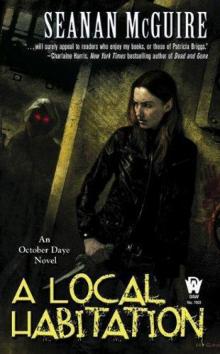 A Local Habitation
A Local Habitation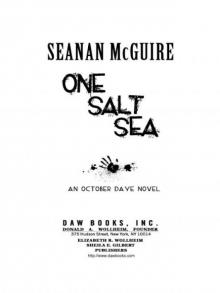 One Salt Sea
One Salt Sea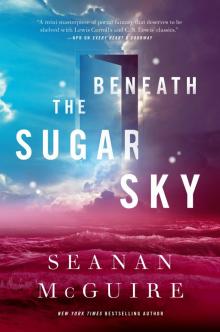 Beneath the Sugar Sky
Beneath the Sugar Sky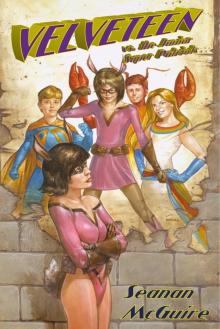 Velveteen vs. The Junior Super Patriots
Velveteen vs. The Junior Super Patriots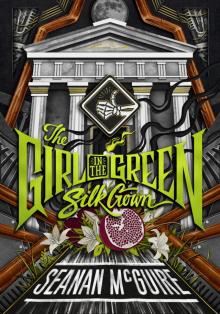 The Girl in the Green Silk Gown
The Girl in the Green Silk Gown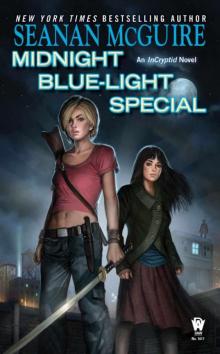 Midnight Blue-Light Special
Midnight Blue-Light Special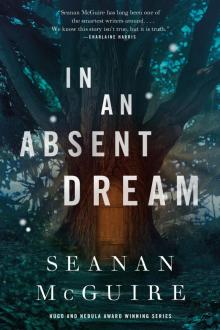 In an Absent Dream
In an Absent Dream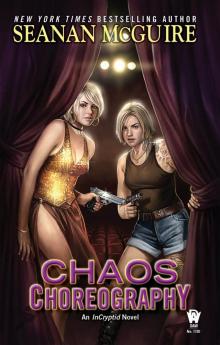 Chaos Choreography
Chaos Choreography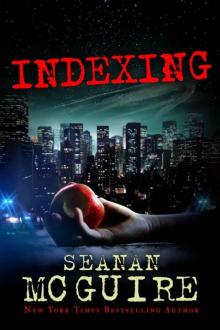 Indexing
Indexing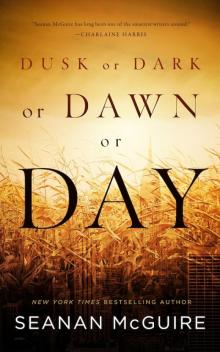 Dusk or Dark or Dawn or Day
Dusk or Dark or Dawn or Day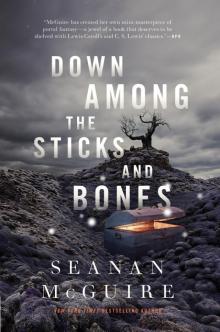 Down Among the Sticks and Bones
Down Among the Sticks and Bones The Razor's Edge
The Razor's Edge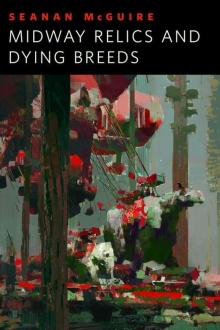 Midway Relics and Dying Breeds
Midway Relics and Dying Breeds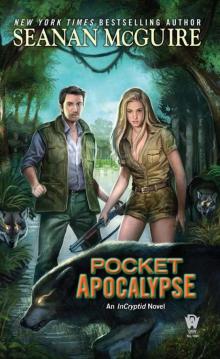 Pocket Apocalypse
Pocket Apocalypse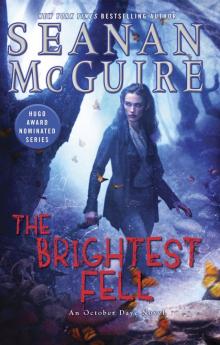 The Brightest Fell
The Brightest Fell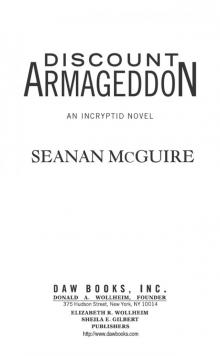 Discount Armageddon
Discount Armageddon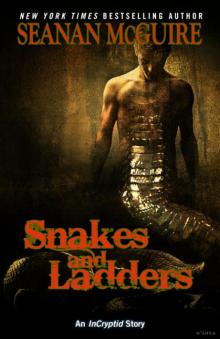 Snakes and Ladders
Snakes and Ladders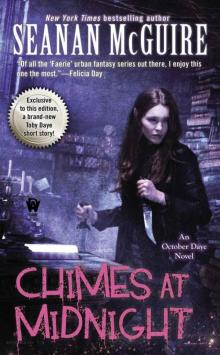 Chimes at Midnight
Chimes at Midnight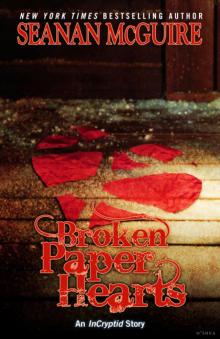 Broken Paper Hearts
Broken Paper Hearts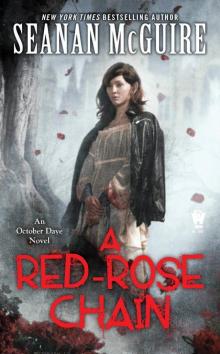 A Red-Rose Chain
A Red-Rose Chain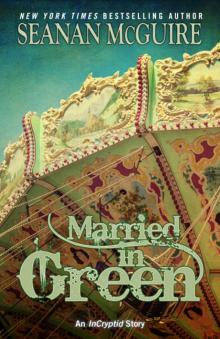 Married in Green
Married in Green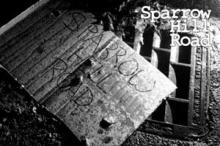 Sparrow Hill Road 2010 By Seanan
Sparrow Hill Road 2010 By Seanan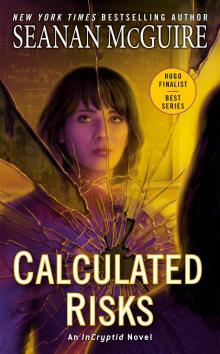 Calculated Risks
Calculated Risks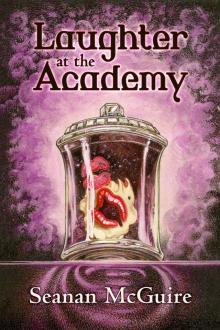 Laughter at the Academy
Laughter at the Academy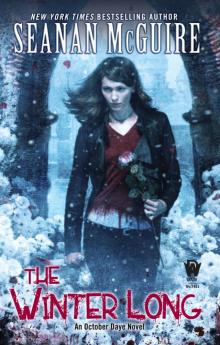 The Winter Long
The Winter Long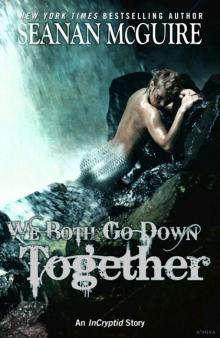 We Both Go Down Together
We Both Go Down Together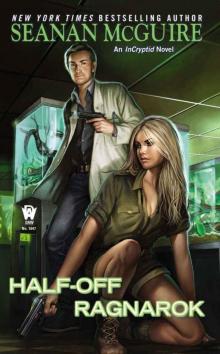 Half-Off Ragnarok
Half-Off Ragnarok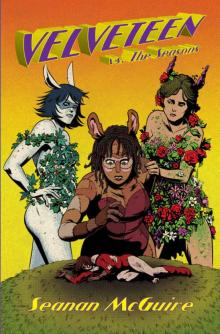 Velveteen vs. The Seasons
Velveteen vs. The Seasons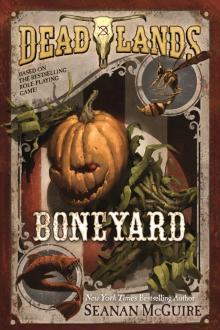 Boneyard
Boneyard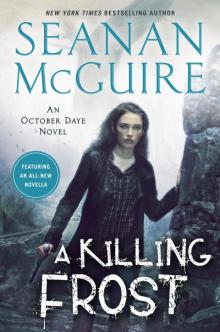 A Killing Frost
A Killing Frost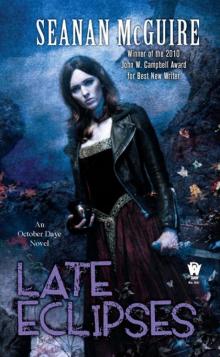 Late Eclipses
Late Eclipses Submerged
Submerged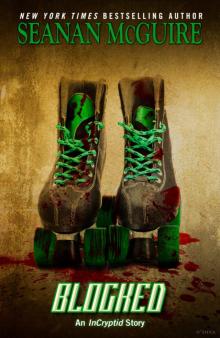 Blocked
Blocked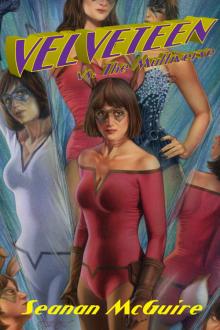 Velveteen vs. The Multiverse
Velveteen vs. The Multiverse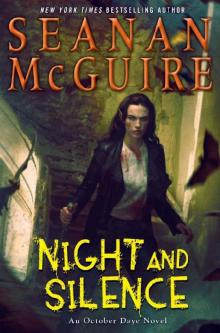 Night and Silence
Night and Silence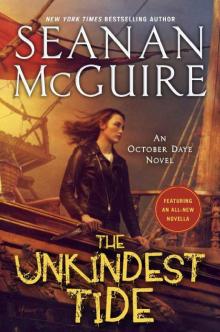 The Unkindest Tide (October Daye)
The Unkindest Tide (October Daye)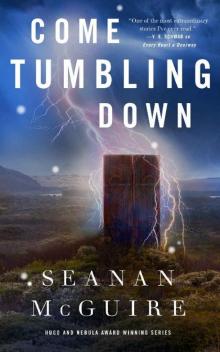 Come Tumbling Down (Wayward Children)
Come Tumbling Down (Wayward Children)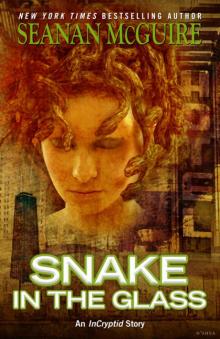 Snake in the Glass
Snake in the Glass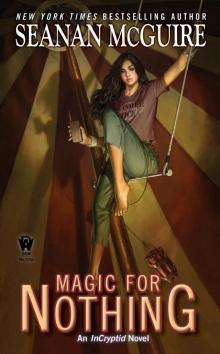 Magic for Nothing
Magic for Nothing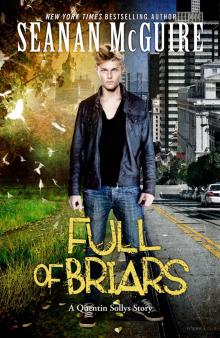 Full of Briars
Full of Briars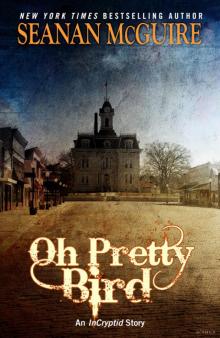 Oh Pretty Bird
Oh Pretty Bird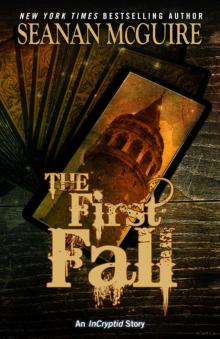 The First Fall
The First Fall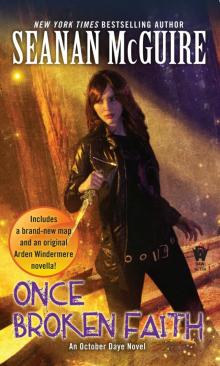 Once Broken Faith
Once Broken Faith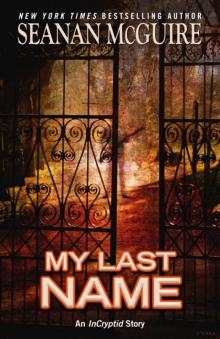 My Last Name
My Last Name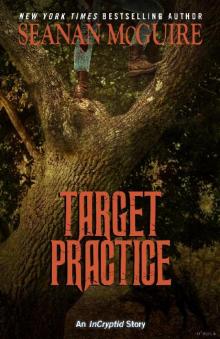 Target Practice
Target Practice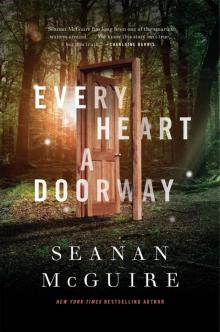 Wayward Children 01 - Every Heart a Doorway
Wayward Children 01 - Every Heart a Doorway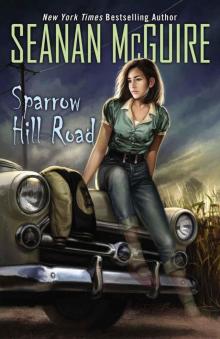 Sparrow Hill Road
Sparrow Hill Road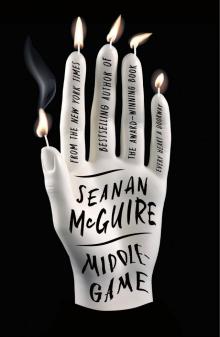 Middlegame
Middlegame Juice Like Wounds
Juice Like Wounds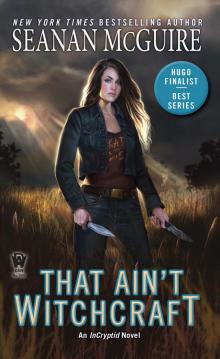 That Ain't Witchcraft
That Ain't Witchcraft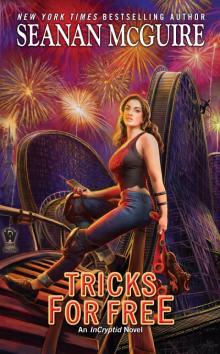 Tricks for Free
Tricks for Free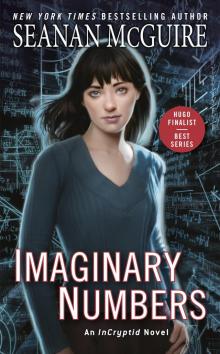 Imaginary Numbers
Imaginary Numbers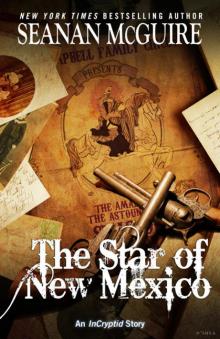 The Star of New Mexico
The Star of New Mexico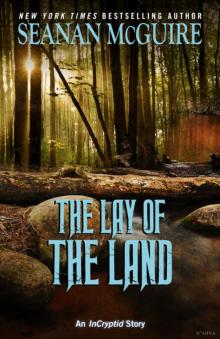 Lay of the Land
Lay of the Land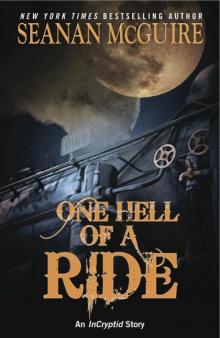 One Hell of a Ride
One Hell of a Ride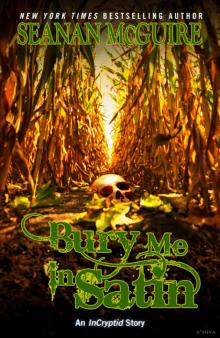 Bury Me in Satin
Bury Me in Satin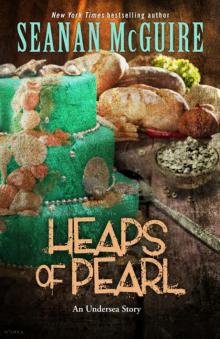 Heaps of Pearl
Heaps of Pearl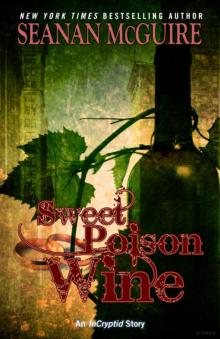 Sweet Poison Wine
Sweet Poison Wine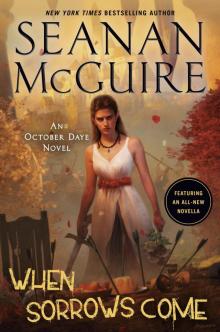 When Sorrows Come
When Sorrows Come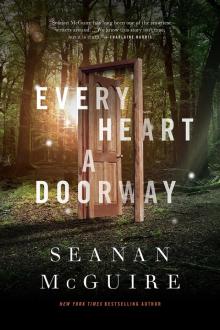 Every Heart a Doorway
Every Heart a Doorway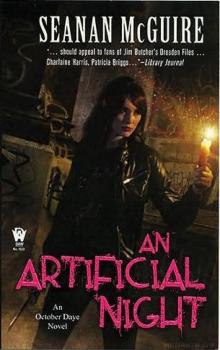 An Artificial Night - BK 3
An Artificial Night - BK 3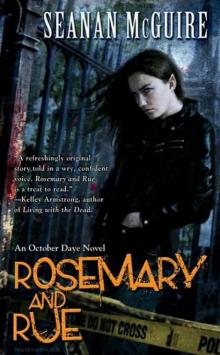 Rosemary and Rue
Rosemary and Rue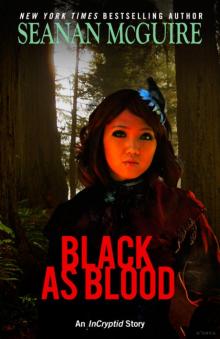 Black as Blood
Black as Blood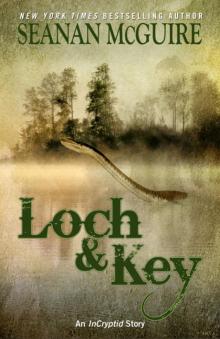 Loch and Key
Loch and Key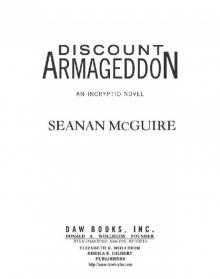 Discount Armageddon: An Incryptid Novel
Discount Armageddon: An Incryptid Novel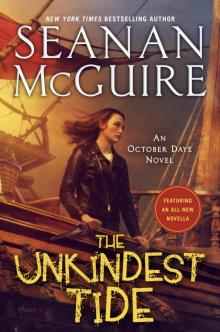 The Unkindest Tide
The Unkindest Tide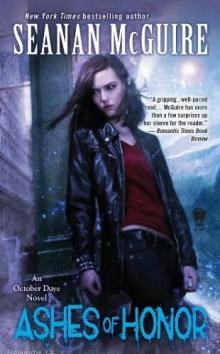 Ashes of Honor od-6
Ashes of Honor od-6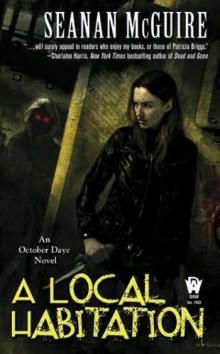 A Local Habitation od-2
A Local Habitation od-2 Waking Up in Vegas
Waking Up in Vegas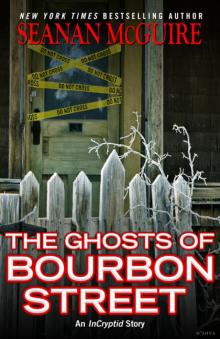 The Ghosts of Bourbon Street
The Ghosts of Bourbon Street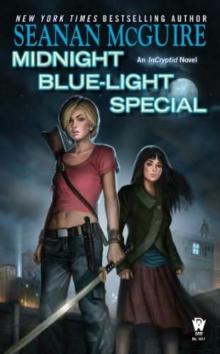 Midnight Blue-Light Special i-2
Midnight Blue-Light Special i-2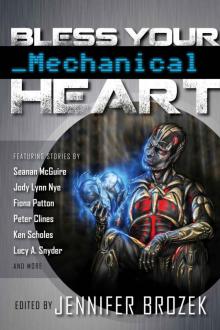 Bless Your Mechanical Heart
Bless Your Mechanical Heart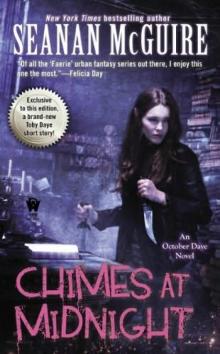 Chimes at Midnight od-7
Chimes at Midnight od-7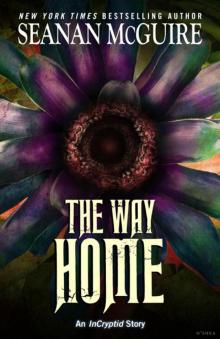 The Way Home
The Way Home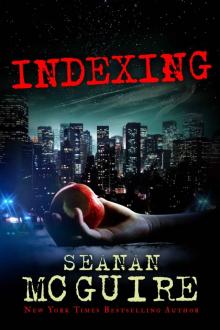 Indexing (Kindle Serial)
Indexing (Kindle Serial)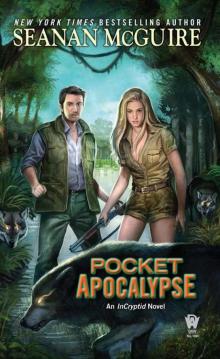 Pocket Apocalypse: InCryptid, Book Four
Pocket Apocalypse: InCryptid, Book Four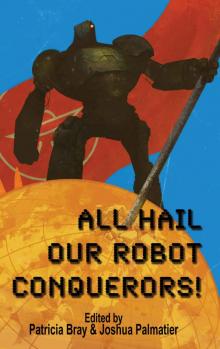 All Hail Our Robot Conquerors!
All Hail Our Robot Conquerors!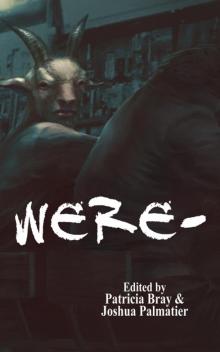 Were-
Were-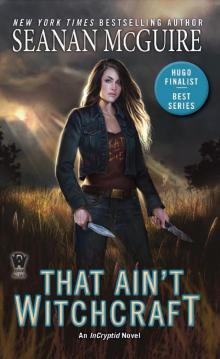 That Ain't Witchcraft (InCryptid #8)
That Ain't Witchcraft (InCryptid #8)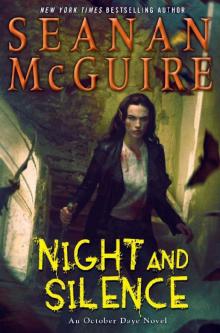 Night and Silence (October Daye)
Night and Silence (October Daye)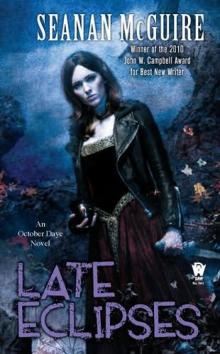 Late Eclipses od-4
Late Eclipses od-4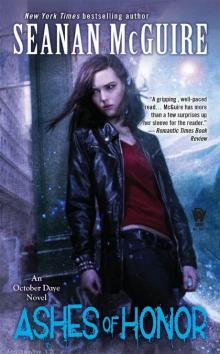 Ashes of Honor: An October Daye Novel
Ashes of Honor: An October Daye Novel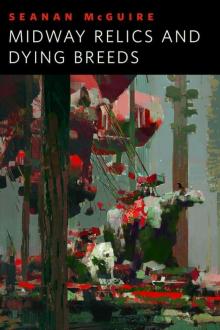 Midway Relics and Dying Breeds: A Tor.Com Original
Midway Relics and Dying Breeds: A Tor.Com Original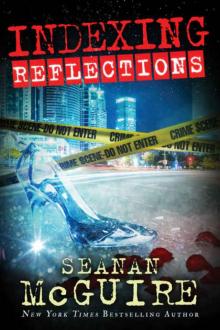 Indexing: Reflections (Kindle Serials) (Indexing Series Book 2)
Indexing: Reflections (Kindle Serials) (Indexing Series Book 2)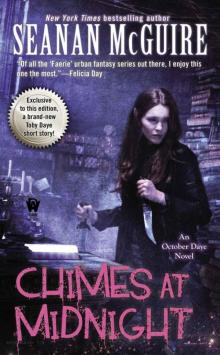 Chimes at Midnight: An October Daye Novel
Chimes at Midnight: An October Daye Novel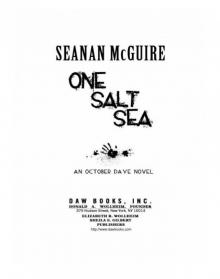 One Salt Sea: An October Daye Novel
One Salt Sea: An October Daye Novel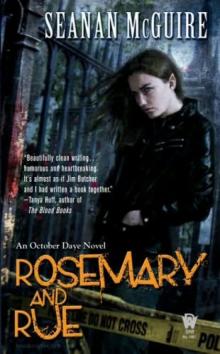 Rosemary and Rue od-1
Rosemary and Rue od-1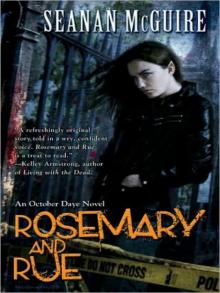 Rosemary and Rue: An October Daye Novel
Rosemary and Rue: An October Daye Novel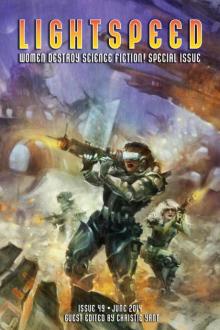 Lightspeed Magazine Issue 49
Lightspeed Magazine Issue 49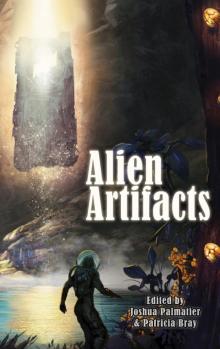 Alien Artifacts
Alien Artifacts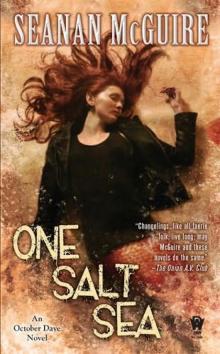 One Salt Sea od-5
One Salt Sea od-5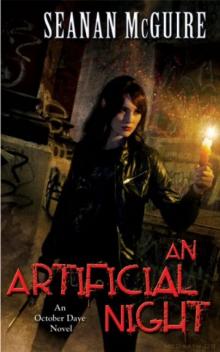 An Artificial Night od-3
An Artificial Night od-3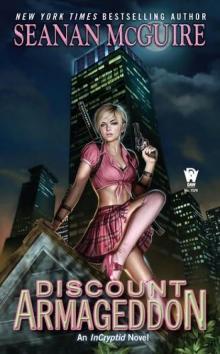 Discount Armageddon i-1
Discount Armageddon i-1